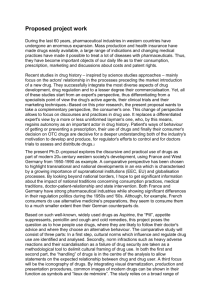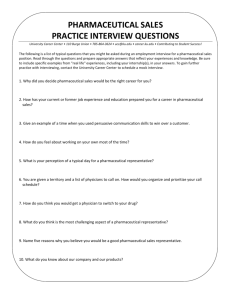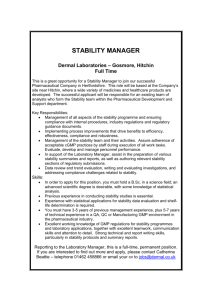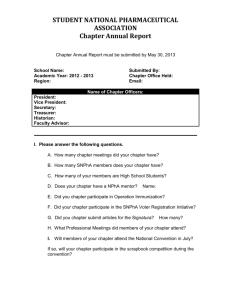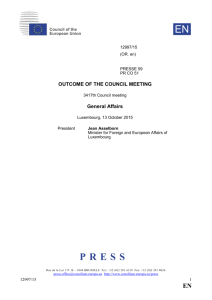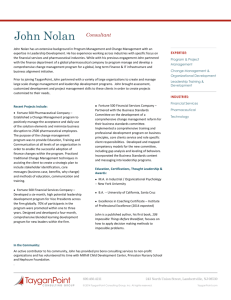Presentaion2 - Pharma News Pakistan
advertisement
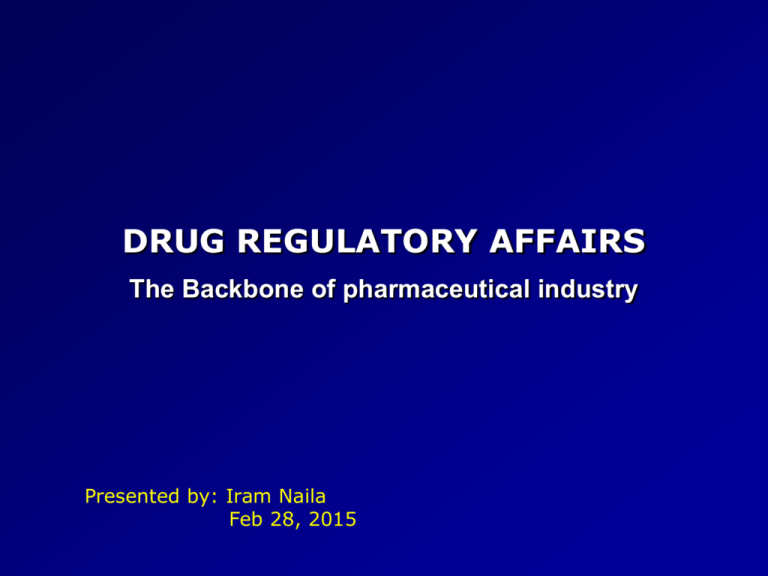
DRUG REGULATORY AFFAIRS The Backbone of pharmaceutical industry Presented by: Iram Naila Feb 28, 2015 Drug Regulatory Affairs 2 Regulatory Affairs Key Players involved.. Drug Regulatory Authority Pharmaceutical Industry Regulatory Affairs Professionals Bridging the gap... 3 Objectives Create awareness, – Role of Drug Regulatory Affairs department in the progress of pharmaceutical industry – Responsibilities of Pharmaceutical Regulatory Affairs Professionals Scope Nature of Pharmaceutical Industry Pharmaceutical Regulatory Affairs Global Drug Regulatory Bodies Drug Regulatory Authority of Pakistan Drug Regulation in Pakistan Regulatory procedures in Pakistan Pharma Regulatory Professionals Global Pharma Regulatory Professional Associations Pharmaceutical Industry-ATTRIBUTES Fast Growing market Highly Regulated industry Ever changing regulations Increased globalization High competitiveness Highly dependent on science & technology Costly R&D, Innovation, Invention Stringent Quality standards Development of new therapeutic fields & technologies Quick development of the world generic markets Increased importance of strategic management Increased importance of regulatory issues (registrations, intellectual property) 6 The Pharmaceutical Industry has Mediated the Opposite Forces Economic Factors Pharmaceutical Industry Scientific Innovation The key to success lies in driving the Research and Development (R&D) efforts of the company to the market in the least possible time & expense with a commercially viable label 8 Role of RA • Identification & Compliance of Regulatory Requirements • Strategic guidance & technical advice to R&D, Production, QC dept of the company • Regulatory submissions and approvals • Keep record of ever-changing legislation 9 Any activity with DRUG.. Prior authorisation/submission needed? NO Does not belong to drug regulatory affairs Yes By whom? (the authority) Subject to regular control? Based on which criteria? (quality, inspection) (objective and subjective) Based on which criteria? By whom? (objective and subjective)) (the authority) 10 Regulatory Affairs 11 Court Room Scenario.. 12 13 14 Communication Gap For example; •Inadequate reporting of data… hamper timely & positive evaluation of registration application. •Even worse, release of product bearing incorrect labeling … product recall. • Loss of sales, image of the product, Brand equity 15 Regulatory Affairs 16 Regulations… Our life is “regulated” in many different ways continuously… 17 Hierarchy of the Rules… Hard law Professional rules (soft law) Ethical rules Custom, fashion, common courtesy 18 18 Hierarchy of the most important professional rules + HIERARCHI Hard law Soft law Constitution Acts of Parliament Government laws Rules framed under Govt. laws Guidelines methodological letters of National Boards/Institutes Scientific literature 19 Almost Everybody knows about Cricket game in Pakistan Imagine a very good cricketer… His only problem is that he does not know the rules e.g. “No Ball”, “LBW”, etc. your opinion…. can he be successful as a team member? 20 The same is valid for Drug Regulatory Affairs! More than simply “administration”! The Art of Pharmacy belongs to the Regulated Field! Thus, to know the relevant regulations is the professional life itself! The problem is: we can not simply learn it, Instead, we must understand the logic behind it! 21 Drug Law in Pakistan Law maker: Parliament, Govt. of Pakistan Implementation of Law: – Drug Regulatory Authority of Pakistan (DRAP) Execution of Drug Laws: – Pharmaceutical companies – Pharmacies – Regulators 22 Drug Law in Pakistan • Drug Regulatory Authority of Pakistan (DRAP) Act 2012 • Drugs Act 1976 • The Drugs (Labeling and Packaging) Rules 1986 • The Drugs (Licensing, Registration and Advertisement) Rules 1976 • The Drugs (Appellate) Rules 1976 • The Drugs (Research) Rules 1978 • The Drugs (Federal Inspector, Federal Drug Laboratory & Federal Government Analyst) Rules 1976 • The Drugs (Import & Export) Rules 1976 • The Drugs (Specification) Rules 1978 23 DRAP ACT 2012 Extends to whole Pakistan Establishment of DRAP Policy Board Change in definition of drug. Some new definitions i.e. Therapeutic goods, Medical Device, Alternative medicine, Health & OTC Products. Control of Non pharma drugs Power of Federal Govt. to make rules Power of provincial Govt. to make rules Refers to Drugs Act for regulatory procedures & approvals…Drugs Act 1976 is still there. 24 Drugs Act 1976 It extends to the whole of Pakistan Regulates drug Import, Export, Manufacture, Storage, Distribution and Sale Registration of drugs under this Act would not constitute defense against infringement regulated by Patent and Design Act 1911. Application of other laws not barred Drugs Act 1976 Composition: Preamble and Scope Definitions Administration and Enforcement Prohibition Offence, Penalties and Procedure Power of Federal Govt. to make rules Power of provincial Govt. to make rules Repeal and Savings 26 Drug Regulatory Authority of Pakistan- DRAP Established under the DRAP Act 2012 Concerned Ministry; National Health Services & Regional Coordination Aims & Objectives – To provide effective coordination and enforcement of Drugs Act, 1976 for provision of drugs and therapeutic goods that are safe, effective, quality and economical. – To bring harmony in interprovincial trade and commerce of drugs and therapeutic goods 27 Drug Regulatory Authority of Pakistan- DRAP 13 Division Headed by Directors Boards & Committees DRAP Policy Board (Headed by CEO) Expert Committees Policy Board of DRAP: - Policies and guidelines - implementation of the guidelines - Functions of functions of DRAP - approve budget of DRAP - Determine all fees and levies 28 DRAP-Responsibilities Regulatory Approvals – Registration & Post Registration Variations of pharmaceutical drugs, Biologicals, Medical Devices, Health Products, Alternative Medicine. – Licensing of Drug Manufacturing units, Biological Manufacturing facilities, Alternative Medicine manufacturing facilities – Pricing of products Quality Control function Pharmacovigilance Guideline: cGMP Guidelines, Guidelines for Enlistment and Registration of Alternative Medicines, Guidelines for Licensing of Pharmaceutical Units. Policies – Contract Manufacturing Policy – Import Policy – Pricing Policy 29 Pharmaceutical Licensing Receipt of proposal Site verification by inspection Deficiency: •Approval suspended •Reapplication after 3-6 months Rejection of application Approval of Layout (Central Licensing Board/Committee_ Formal application after site approval Panel Inspection Report to CLB (Central Licensing Board) Approval and grant of license Marketing Authorization Submission Registration application Dossier evaluation (Evaluation Cell) Dossier complete Inform company for completion of dossier Drug Registration Board New Molecule Reject Negative E.Op Expert Evaluation Me Too product Reject Positive Expert opinion Approved Appellate Board Price Fixation (DPC) Reg Cert. 31 Global Drugs Regulatory Bodies USA : Food and Drug Administration (FDA) Europe: European Medicines Agency (EMA) Japan: Pharmaceuticals and Medical Devices Agency (PMDA) UK: Medicine and Healthcare Products Regulatory Agency (MHRA) Australia: Therapeutic Goods Administration (TGA) Historically, the various regulatory authorities have had their own regulatory procedures…..Inconvenience & High Cost International Conference on Harmonization (ICH) is an attempt to co-ordinate and synthesize international regulatory requirements. 32 ICH Members (Steering Committee 1. US Food and Drugs Administration (FDA) 2. Pharmaceutical Research and Manufacturers of America (PhRMA) 3. European Medicine Agency (EMA) 4. European Federation of Pharmaceutical Industries Associations (EFPIA) 5. Japan Ministry of Health, Labour, and Welfare (MHLW ) 6. Japan Pharmaceutical Manufacturers Association – JPMA International Federation of Pharmaceuticals Manufacturers (IFPMA) Observers: 1. Health Canada 2. WHO 3. European Fair Trade Association (EFTA) 33 ICH Guidelines Q: "Quality" Topics, i.e., Chemical and pharmaceutical Quality Assurance (Stability Testing, Impurity Testing, etc.) S: "Safety" Topics, i.e., those relating to in vitro and in vivo pre-clinical studies (Carcinogenicity Testing etc.) E: "Efficacy" Topics, i.e., those relating to clinical studies in human subject (Dose Response Studies, Good Clinical Practices, etc.) M: "Multidisciplinary" Topics, i.e., cross-cutting Topics which do not fit uniquely into one of the above categories For details: www.ich.org 34 35 • Regulatory professional is central to the business • Relate to almost every discipline within the industry 36 Associations of Pharma RA US: Regulatory Affairs Professional Society (RAPS) UK: The Organization of Pharmaceutical Regulatory Affairs Canada: Canadian Association of Professionals in Regulatory Affairs 37 The RA professionals-Roles and Responsibilities Role starts from research and development phases moving into clinical trials extending through premarket approvals manufacturing labeling and advertising Post marketing Surveillance 38 The RA professionalsRoles and Responsibilities Responsible for Use and assimilate information provided by all departments present that information to regulatory authorities i.e. for registration, licensing and other approvals feed back their opinions to the rest of the company Subsequent negotiations to obtain and maintain Regulatory approvals Regulatory Intelligence Strategic and technical advice at the highest level ….. an important contribution both commercially and scientifically to the success of a development programme Ensure Regulatory Compliance for company’s products 39 Key Regulatory Competencies Understanding of Pharmaceutical sector knowledge of regulations. Tracking of regulatory changes and interpretation the implications of the regulations to the organization. Knowledge and application of regulatory approval procedures: Good Manufacturing Practice (GMP) Knowledge and application of Pharmacovigilance Knowledge about emerging technologies As they move up the career ladder … – business skills (finance, marketing, policy, etc.) – Ability to integrate their regulatory knowledge into business strategy and decision making 40 Key Regulatory Competencies Soft Skills: Time management Marketing for regulators Negotiation and influencing skills Presentation skills strategic thinking Leadership skills Team work in a global environment Project management Crisis management 41 How to be a good regulatory professional? ‘Right first time’ approach Scientifically accurate and knowledgeable …. Better response from regulators. The ability to tackle data in a wide range of scientific areas. Quickly grasp new concepts and complex technical information. Understanding of legal & scientific matters and Attention to detail. An analytical frame of mind: Ability to evaluate the strengths and weaknesses of the technical and legal options open to a company They are strategic thinker Integrity and the ability to inspire trust and confidence 42 Canvas of RA Regulatory professionals are employed in industry, government and academia Involved with a wide range of products – pharmaceuticals – medical devices – in vitro diagnostics – biologics and biotechnology – nutritional products – cosmetics – veterinary products 43 Who is eligible Regulatory professionals come from diverse backgrounds Graduates in a scientific discipline – particularly pharmacy, or may be other life sciences TOPRA offers an MSc in Regulatory Affairs experience is a key asset for regulatory professionals Usually have experience in other careers before transitioning into regulatory affairs. The candidates that moved straight into Regulatory Affairs from university often moved to small to mid size pharmaceutical, generic and device based companies. 44 RA - the best things about Challenging and dynamic field. combines knowledge and skills from many different fields Guardian of the image & integrity of the organization they work for. Resistant to industry downsizing RA professionals are in demand, and the demand is increasing. Senior professionals are increasingly being appointed to Boardroom positions, where they can advise upon and further influence the strategic decisions of their companies. It’s the work you can really be proud of. 45 O.K., let us change the topic now… 46 46
